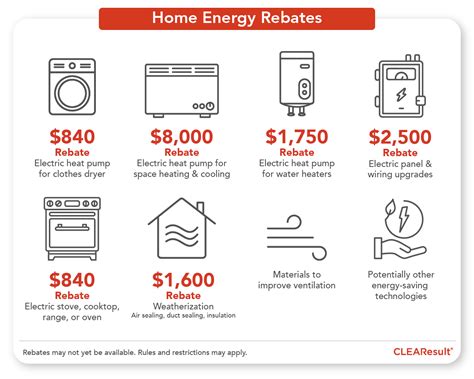Saving Green: How the Inflation Reduction Act is Transforming Appliance Rebates
The Inflation Reduction Act (IRA) has emerged as a game-changer in the realm of energy efficiency, particularly focusing on household appliances. With rising energy costs and climate concerns at the forefront of many homeowners’ minds, the IRA introduces substantial rebates and incentives aimed at encouraging the adoption of energy-efficient appliances. This initiative not only aims to stimulate economic growth but also seeks to reduce energy consumption and lower carbon footprints across the nation.
The Overview of the Inflation Reduction Act
Passed in 2022, the Inflation Reduction Act is a comprehensive legislative initiative designed to curb inflation while fostering clean energy and making significant investments in renewable energy technologies. One of the act’s pivotal components is its focus on enhancing energy efficiency in homes, particularly through the promotion of energy-efficient appliances.
Appliance Rebates Under the IRA
The IRA introduces a robust rebate program for homeowners looking to replace their old, inefficient appliances. This is crucial as appliances account for a significant percentage of household energy consumption. Some of the major appliances eligible for rebates include:
- Refrigerators
- Washing machines
- Dishwashers
- Heating and cooling systems (HVAC)
- Water heaters
Homeowners can receive substantial rebates, which can reduce the upfront costs of these appliances significantly. For example, a rebate of up to $2,000 may be available for certain HVAC systems, while rebates for energy-efficient refrigerators can reach up to $500.
Promoting Energy Efficiency and Sustainability
One of the main objectives of the IRA is to make energy efficiency more accessible to the general public. By incentivizing the purchase of energy-efficient appliances, the act encourages homeowners to make choices that contribute to sustainability. The rebates reduce the financial barriers that often prevent homeowners from upgrading to more energy-efficient options. As a result, households can save more over time through reduced energy bills.
Benefits of Energy-Efficient Appliances
Investing in energy-efficient appliances provides an array of benefits:
- Cost Savings: Energy-efficient appliances typically consume less energy, resulting in lower utility bills.
- Longer Lifespan: These appliances are often designed to last longer, offering a better return on investment.
- Environmental Impact: Reduced energy consumption contributes to lower greenhouse gas emissions, aiding in the fight against climate change.
- Improved Comfort: Modern, energy-efficient appliances often have improved technology that enhances function and performance.
How to Access Rebates
As the IRA details its rebate programs, accessing these benefits typically involves a few steps:
- Research Eligible Appliances: Homeowners should first familiarize themselves with which appliances qualify for rebates under the IRA.
- Check Local Programs: Many states and localities may have additional programs that complement the IRA. Homeowners should consult their local energy office for specific information.
- Purchase and Apply: After purchasing eligible appliances, homeowners can apply for rebates directly through the official channels outlined by the IRA.
Challenges and Considerations
Despite the numerous benefits of the Inflation Reduction Act and its appliance rebate program, there are some challenges that homeowners and manufacturers may face:
- Availability of Appliances: The demand for energy-efficient models may outpace supply, causing delays in availability.
- Understanding Eligibility: Some homeowners may find it challenging to navigate the complex eligibility requirements for various rebates.
- Initial Costs: Although rebates significantly reduce upfront costs, some homeowners may still find the initial investment daunting.
Looking to the Future
The Inflation Reduction Act represents a vital step towards promoting energy-efficient living and reducing overall energy consumption in the United States. As the program evolves, it is vital for stakeholders—policy-makers, manufacturers, and consumers—to work collaboratively towards the common goal of sustainability. Increased awareness and education around energy-efficient appliances can further empower homeowners to enhance their energy efficiency, resulting in long-term benefits not just for individuals but for society as a whole.
Conclusion
The Inflation Reduction Act is transforming the landscape of appliance rebates, making energy-efficient options more accessible and affordable for homeowners across the nation. By providing substantial incentives for the purchase of appliances that save energy and reduce carbon footprints, the IRA aligns economic growth with environmental responsibility. Through these efforts, not only are consumers positioned to save money, but they are also contributing to a larger movement aimed at creating a more sustainable future.
FAQs
1. What is the Inflation Reduction Act?
The Inflation Reduction Act is a U.S. legislative initiative aimed at curbing inflation, promoting economic growth, and fostering clean energy through significant investments in energy-efficient technologies.
2. What appliances are covered under the rebate program?
Eligible appliances include refrigerators, washing machines, dishwashers, HVAC systems, and water heaters, among others.
3. How much can I save with rebates?
Rebates under the IRA can vary, with some appliances offering rebates of up to $2,000, significantly lowering the cost of purchasing energy-efficient models.
4. How do I apply for appliance rebates?
Homeowners must research eligible appliances, check local programs, and apply through specific channels outlined by the IRA after making their purchase.
5. What are the environmental benefits of energy-efficient appliances?
Energy-efficient appliances reduce energy consumption and greenhouse gas emissions, aiding in the fight against climate change and promoting a sustainable future.
Download Inflation Reduction Act Appliance Rebates
